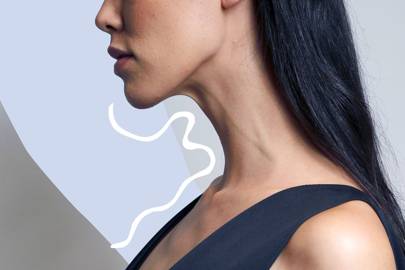[ad_1]

Former Love Island star Demi Jones has had a potentially cancerous lump removed from her neck. Taking to Instagram, the reality star has been keeping her 1.1 million followers updated about the removal since finding the lump last month and she has since had it removed.
“Face and neck really swollen but the surgery went really well,” the reality star said following the surgery. “I literally had a lump the size of a golf ball on my thyroid. The NHS staff at the QA Portsmouth have been unbelievable. And thank you for all your messages.”
Why every woman should know about this simple blood test that can detect ovarian cancerDemi adds that the reason she has been so open about finding the lump and the process to have it removed is so that others are inspired to get their lumps check too - and so that they persist with doctors if they feel something is wrong.
“Please don't put off getting lumps checked,” Demi said at the time. “If appointments keep getting cancelled then you need to chase it up. I was supposed to have this appointment six months ago. At my scan they said ‘everything looks fine’ and went to send me on my way.
“I challenged it and asked if they could do more, in which they said ‘oh well we can test the fluid if you want us to?’ Thank god I asked as it was the fluid that came back potentially cancerous. Always push!”
While Demi’s lump was found in her thyroid, a lump in your neck could potentially point to several different issues including cancer, depending on where it’s found. The NHS says a lump in your neck could be a symptom for laryngeal, throat, salivary gland and nasopharyngeal cancer.
“Lumps in the neck are extremely common and have lots of causes. It’s important to be aware of what’s normal for you, and to ‘check-CUP for cancer’, to check for a Change that is Unexplained or Persistent,” Jo Stoddart, Cancer Senior Healthcare Development Manager at Bupa UK Insurance tells GLAMOUR.
You can now get a gynaecological cancer consultation in your local SuperdrugWhat could a lump on your neck mean?
A lump on your neck doesn’t automatically equate to cancer. Jo says one of the most common causes is a swollen lymph node.
“If any of the lymph nodes in your neck become infected or inflamed, they will become enlarged and form a lump. Your lymph nodes can become inflamed because of a cold, tonsillitis, ear infections and glandular fever,” Jo continues.
“A neck lump could also indicate a skin problem, for example an abscess or skin tag. Occasionally, a lump can come from the main blood vessel in the neck; sometimes this enlarges and causes a lump called an aneurysm.”
The cause could also be a fluid-filled lump formed within your thyroid.
“If your lump is soft or if it goes on its own, it is unlikely to be anything serious, however it is still important to still get this checked out if you’re worried. Make sure that you seek medical advice straight away if your lump feels hard, and if it has gradually grown over a few weeks,” Jo advises.
“If you have an appointment to see your GP about a lump, remember to mention any other symptoms you’re experiencing too, such as difficulty swallowing, losing weight without trying to, or you’ve noticed a change in your voice. Your doctor will ask you general questions about the lump, for example how long it has been there, if it hurts and if it came on suddenly. They should also examine the lump and refer you for blood tests (to check on your thyroid function), and to rule out cancer.”
A year in lockdown has triggered an eating disorder pandemic, so why are so many women falling through the cracks in the healthcare system?How can you check for lumps on your neck?
As well as doing regular breast examinations for any potential lumps in your breast, it’s a good idea to get acquainted with how your neck regularly looks and feels as well.
“It’s good to be aware of how your body usually looks and feels, but there’s no need to check yourself at a set time or in a set way. Instead, get to know your body and what it normally feels like, so it’s easier to spot any unusual changes. If you do notice anything unusual, it’s important to speak to your doctor straight away,” Jo explains.
“With your fingertips, feel around your neck in a gentle, circular motion. Begin around your ear and then finish just above the collar bone. Check both sides of your neck and compare how they feel. Tilt your head towards the side you’re examining (this will help to relax your muscle). Gently press your fingers under the muscle.”
Cancer Research says head and neck cancer is the 8th most common type of cancer in the UK.
“Since the early 1990s, head and neck cancer rates have increased by a third (33%) in the UK. Rates in females have increased by more than two-fifths (43%), and rates in males have increased by almost a quarter (23%),” Jo adds
Is it safe to delay your period?How can you treat head and neck cancer?
“There are lots of different treatment options available for neck cancer, including surgery, radiation therapy, chemotherapy, targeted therapy, or a combination of treatments,” Jo explains.
“Surgery is often the first-line treatment option for this type of cancer, but it may be combined with radiation therapy and/or chemotherapy.”
If you have any concerns about a lump in your neck or anywhere else on your body, make an appointment with your GP. You can find out more about head and neck cancer at nhs.uk/head-and-neck-cancer
Source link
[ad_2]
source https://earn8online.com/index.php/257703/how-to-check-your-neck-for-cancerous-lumps/
No comments:
Post a Comment